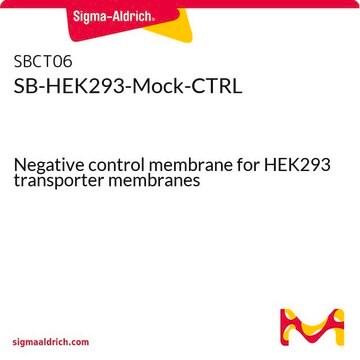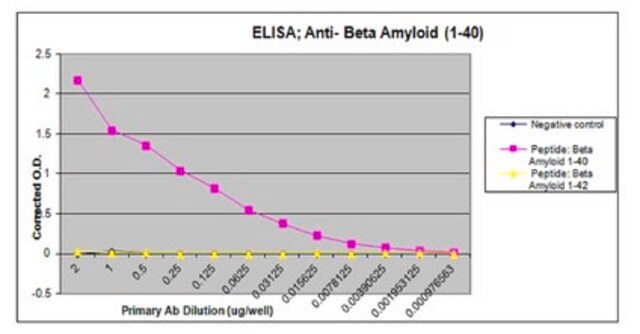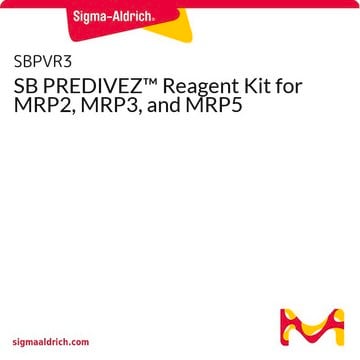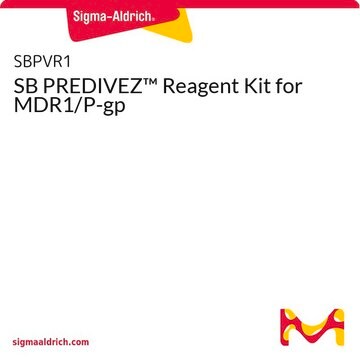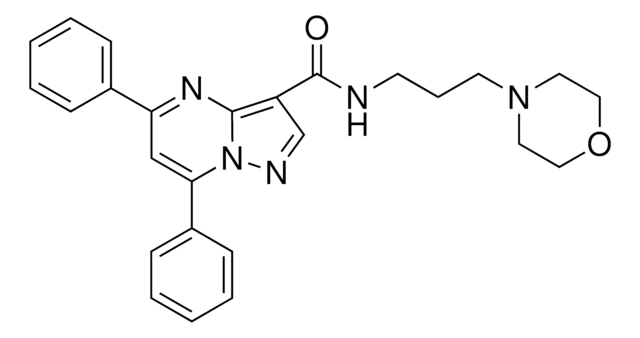SBVT07
SB-MRP4-HEK293
MRP4 human membrane vesicles
Synonyme(s) :
ABCC4, MRP, Multidrug resistance associated protein 4
Se connecterpour consulter vos tarifs contractuels et ceux de votre entreprise/organisme
About This Item
Code UNSPSC :
41106514
Produits recommandés
Produit recombinant
expressed in HEK 293 cells
Forme
liquid
Concentration
5 mg/mL
Couleur
off-white
Numéro d'accès UniProt
Conditions d'expédition
dry ice
Température de stockage
−70°C
Informations sur le gène
human ... ABCC4(10257)
Description générale
Membrane Preparations for Vesicular Transport Assays (VT) are suitable for general drug-efflux transporter interaction studies. Both substrate and inhibitor interactions can be assessed using vesicles. The success of substrate interaction studies strongly depends on the passive permeability of the compound. High permeability substrates might not be detected. Control Membranes with no-, or significantly lower transporter activity are also available.
Multidrug resistance associated protein 4 (MRP4), also known as ATP binding cassette subfamily C member 4 (ABCC4), is encoded by the gene mapped to human chromosome 13q32.1. The encoded protein belongs to the family of ATP-binding cassette transporters involved in ATP driven transmembranous transport of substrates.
Application
In the vesicular transport assay so-called "inside-out" membrane vesicles containing ABC transporters are applied. Incubating substrates of the respective efflux transporter in the presence of the inverted membrane vesicles and ATP will allow measuring accumulation of the substrates into the vesicles. In many cases radiolabeled reporter substrates are used but recently SOLVO developed the new PREDIVEZTM Vesicular Transport Kits that use fluorescent reporter substrates.
The standard vesicular transport assay is an inhibitory assay performed with cold test articles. This assay provides information on any interaction between the ABC transporter and the test article. The transport of the reporter substrate is measured in the presence of the test article (typically in 7 concentrations) and IC50 is defined as the concentration inhibiting the transport of the reporter substrate by 50%.
Should radiolabeled form of the investigated compound or adequate analytical methods (LC/MS, HPLC) be available, the vesicular transport assay may be performed in a direct format without the reporter substrate and may identify substrate nature of the test article. The vesicular transport substrate assay is a low throughput assay. It is suitable for low permeability test compounds as high permeability compounds may escape from the vesicles through the lipid bilayer.
The standard vesicular transport assay is an inhibitory assay performed with cold test articles. This assay provides information on any interaction between the ABC transporter and the test article. The transport of the reporter substrate is measured in the presence of the test article (typically in 7 concentrations) and IC50 is defined as the concentration inhibiting the transport of the reporter substrate by 50%.
Should radiolabeled form of the investigated compound or adequate analytical methods (LC/MS, HPLC) be available, the vesicular transport assay may be performed in a direct format without the reporter substrate and may identify substrate nature of the test article. The vesicular transport substrate assay is a low throughput assay. It is suitable for low permeability test compounds as high permeability compounds may escape from the vesicles through the lipid bilayer.
SB-MRP4-HEK293 has been used in vesicular transport study.
Actions biochimiques/physiologiques
Multidrug resistance associated protein 4 (MRP4) plays a vital role in substrate-specific transport of endogenous and exogenous substrates. It also has a role in non-neoplastic conditions. MRP4 also contributes to bile secretion and various other physiological roles. Upregulated expression of the gene is associated with the pancreatic cancer development. Thus, MRP4 can be considered as a potent therapeutic target for pancreatic cancer.
Forme physique
Supplied as frozen membrane vesicles, containing 5 mg/ml membrane protein, labeled with volume, catalog number (transporter) and date of production.
Informations légales
Distributed for SOLVO Biotechnology, Inc.
Produit(s) apparenté(s)
Réf. du produit
Description
Tarif
Code de la classe de stockage
10 - Combustible liquids
Classe de danger pour l'eau (WGK)
WGK 2
Point d'éclair (°F)
Not applicable
Point d'éclair (°C)
Not applicable
Certificats d'analyse (COA)
Recherchez un Certificats d'analyse (COA) en saisissant le numéro de lot du produit. Les numéros de lot figurent sur l'étiquette du produit après les mots "Lot" ou "Batch".
Déjà en possession de ce produit ?
Retrouvez la documentation relative aux produits que vous avez récemment achetés dans la Bibliothèque de documents.
Christoph A Ritter et al.
Drug metabolism reviews, 37(1), 253-278 (2005-03-08)
Like other members of the multidrug resistance protein (MRP)/ABCC subfamily of ATP-binding cassette transporters, MRP4 (ABCC4) and MRP5 (ABCC5) are organic anion transporters. They have, however, the outstanding ability to transport nucleotides and nucleotide analogs. In vitro experiments using drug-selected
The ABCC4 gene is a promising target for pancreatic cancer therapy
Zhang Z, et al.
Gene, 491(2), 194-199 (2012)
Efflux transport of chrysin and apigenin sulfates in HEK293 cells overexpressing SULT1A3: The role of multidrug resistance-associated protein 4 (MRP4/ABCC4)
Li W, et al.
Biochemical Pharmacology, 98(1), 203-214 (2015)
Erratum to: Multidrug resistance protein 4 (MRP4) expression in prostate cancer is associated with androgen signaling and decreases with tumor progression
Montani M, et al.
Virchows Archiv, 462(4), 437-443 (2013)
Markos Leggas et al.
Molecular and cellular biology, 24(17), 7612-7621 (2004-08-18)
The role of the multidrug resistance protein MRP4/ABCC4 in vivo remains undefined. To explore this role, we generated Mrp4-deficient mice. Unexpectedly, these mice showed enhanced accumulation of the anticancer agent topotecan in brain tissue and cerebrospinal fluid (CSF). Further studies
Notre équipe de scientifiques dispose d'une expérience dans tous les secteurs de la recherche, notamment en sciences de la vie, science des matériaux, synthèse chimique, chromatographie, analyse et dans de nombreux autres domaines..
Contacter notre Service technique